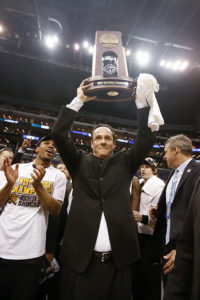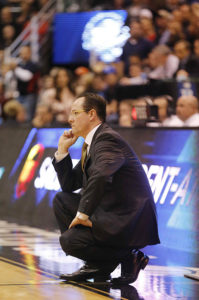State of Shock: Wichita State’s Gregg Marshall proving mid-majors can contend
They were designated “Cinderella” of the 2013 NCAA tournament, but that’s a term that never quite sat well with Wichita State men’s basketball coach Gregg Marshall.

Their presence there was no fluke. They belonged among the elite.
The Shockers’ thrilling victory over No. 2 seed Ohio State and first Final Four in 48 years was the summit of their magical season but hardly the program’s first taste of success. Wichita State had won at least 25 games each of the last four seasons, suggesting Marshall’s “mid-major” Shockers were capable of doing battle with college basketball’s giants.That may surprise many outside of Kansas, but not those donning the university’s yellow and black. They believed all along.
“I don’t feel like we’re underdogs, but that’s fine if other people want to treat us that way, Marshall said. The key is not what people say before the game but who plays better for 40 minutes. I feel like we’re as good or better than anybody we play when we hit that court.”
Before Wichita State’s Elite Eight win over the Buckeyes, they bounced the region’s top-seeded Gonzaga Bulldogs. The Shockers’ season ended at the hands of eventual champion Louisville, but by that point Wichita State’s case had been made. Marshall and his collection of largely unknown athletes had captured the attention of college basketball.
Marshall had been down this road before. In nine seasons at Winthrop, he piled up a 194-83 record and the Eagles made seven NCAA tournament appearances. Many argue the NCAA system doesn’t allow mid-major programs to flourish, but Marshall had spent years debunking that theory.
The Shockers entered the 2013-14 season ranked 16th in the nation. They’ve experienced the Final Four and stood at the cusp of a national title game in front of more than 75 000 fans. Now it’s time to take the next step.
Perpetual underdogs
Marshall proved his team can compete with anyone, but nothing comes easy. Wichita State doesn’t draw the five-star athletes that flock to programs like Kentucky and Duke. That means he must lure lesser-known recruits with room for development.
Athleticism is high on Marshall’s wish list, but he also targets players he believes are coachable. They may not be an elite 1-on-1 defender the first time they step onto the practice court, but those skills can be taught if the recruit is willing to learn.
At the end of the day, Marshall wants a mix of athletes who thrive at various aspects of the game — rebounding, shooting, defending. That’s what gives him the best chance to win.
“We try to recruit guys that are good but are also going to get better, they’re going to get stronger and they’re going to develop their skills, Marshall said. We want them to work hard and give us an honest day’s effort in the classroom, community and on the court. If they do that, we got a system in place that basically guarantees their success.”
Marshall’s formula seems to work. In six seasons at Wichita State, he carries a 139-70 record. His first year leading the Shockers, the team won just 11 games, finishing ninth in the Missouri Valley Conference. Three years later, they were NIT champions.
That led to last season and Wichita State’s memorable journey to the Final Four. The ninth-seeded Shockers were given little chance to survive the tournament’s first week, but the skeptics never rattled their confidence. Marshall said after more than a decade leading mid-major programs, he’s used to pundits writing his team off come postseason.
John Kresse knows how it feels. Kresse, who Marshall calls one of his distinguished mentors, coached basketball for 38 years, hiring Marshall in 1988 as an assistant coach at the College of Charleston (S.C.). While Marshall was on staff, the program made the jump from NAIA to Division I, facing an entirely new class of talent.
Like Marshall’s 2013 squad, the College of Charleston developed a reputation for upsetting some of basketball’s best teams. There’s a particular strategy coaches must take when facing top-tier programs, and Kresse said it starts with defense.
“That way when you’re playing that Goliath and you can keep the score close through a controlled game, you can really put the pressure on them when it gets down to the last few minutes, he said. Greg’s players had the courage, fortitude and confidence to win those games down the stretch, and I think it starts with his leadership and teaching them how to execute and hit their foul shots.”
 Marshall had another approach during the NCAA tournament, and that was a quick-start offense. The Shockers built a 13-point first-half lead against Gonzaga, started the La Salle game on a 17-3 run and even held at 13-point advantage against Ohio State in the first half of their Elite Eight game.
Marshall had another approach during the NCAA tournament, and that was a quick-start offense. The Shockers built a 13-point first-half lead against Gonzaga, started the La Salle game on a 17-3 run and even held at 13-point advantage against Ohio State in the first half of their Elite Eight game.
Marshall’s team believed it was important to “punch opponents in the mouth, attacking offensively from the opening tip. That’s part of the message behind Play Angry” — a mantra adopted by the team last year that’s proudly displayed on T-shirts throughout campus.
Marshall said the phrase came from Antoine Carr, a Wichita State alumnus who spent 16 years in the NBA. Carr spoke to the Shockers during a tough stretch midway through the 2013 season, and he reminded them why it was important to play with attitude.
“It’s about coming out and wanting it more than the opposition, Marshall said. Being the guy willing to lay it on the line. That’s what it meant for us, and our guys lived that during the tournament run.”
Rise through the ranks
While attending Randolph-Macon College (Va.) in the mid-1980s, Marshall considered attending law school. At that time, he had no idea he would coach basketball.
Marshall said it was his college coach, Hal Nunnally, who provided the encouragement. Nunnally thought Marshall had a great mind for the game and he often hosted recruits when they visited the campus. After Marshall graduated, Nunnally offered him a job on his staff for $10 000 per year. Marshall accepted.
From there Marshall slowly began his ascent through the ranks, accepting jobs with some of the most brilliant minds in college basketball. He left Randolph-Macon to join Kevin Eastman’s staff at Belmont Abbey (N.C.). Eastman has spent nearly a decade on Doc Rivers’ staff and is now assistant coach for the L.A. Clippers.
Marshall then left to join Kresse at the College of Charleston, where he would spend eight seasons. Kresse recalled his first meeting with Marshall, saying he was impressed with his knowledge and personality. When his program made the jump to Division I, Marshall aided the transition as “an unbelievable recruiter and evaluator.”
“He knew the game and was able to teach it extremely well, said Kresse, who in 2009 was inducted into the New York City Basketball Hall of Fame. The players responded extremely well to his coaching techniques. At our level, we had to develop players because we didn’t get the best of the best.
“Greg has the complete package to get to the pinnacle of coaching. He may not be at Kentucky, Louisville or Kansas, but he can coach with the best of them.”
Those who have shared the bench with Marshall describe him as having a special talent for teaching the game and developing athletes, but Marshall said many of his skills are acquired. Coaches must make every effort to learn from the best, and Marshall was in the fortunate position to do just that.
Marshall spent two years under Greg White at Marshall University (W. Va.) before landing his first head coaching position at Winthrop. It was there the college basketball world began to learn his name.
Marshall calls last year’s Final Four appearance the pinnacle of his career to this point, but a national title is within his grasp. The Shockers, along with a handful of other programs, are redefining what it means to be a mid-major program, and many have become legitimate contenders for championships.
It starts with passion, and Marshall strongly believes all coaches must have it to lead their respective programs and build their careers. It’s a “labor of love, he said, and that commitment to the game and his athletes might ultimately carry the Shockers to the top.
“You get into this because you love working with the game and you love working with young people and trying to give them a road map for success in their lives, Marshall said. If you’re lucky enough to get with those mentors and make the right career decisions, sometimes you can end up in the Final Four and do pretty well for yourself.”









